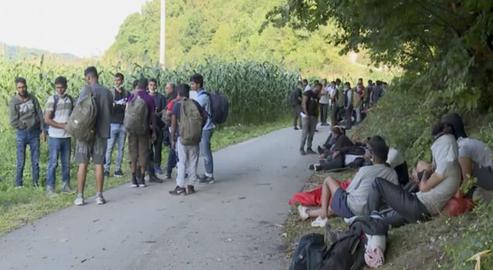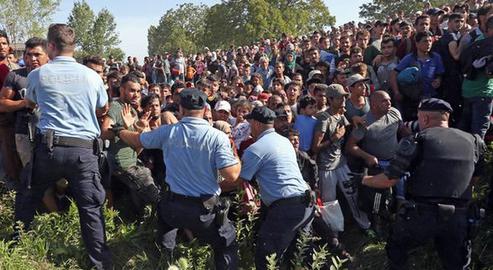According to official statistics, at least 10,000 refugees, Iranians among them, are currently stranded in Bosnia and Herzegovina, outside the borders of the European Union and unable to apply for asylum. With no facilities and no way forward, these people are in limbo. The police presence is increasing day by day – as is the number of new arrivals. Despite a warning from the EU last week of looming “humanitarian crisis”, the unwilling host country’s policy appears to be not to help refugees get on their feet, but to starve them out.
"Some asylum seekers can get healthcare in the camps, but others are living in forests and on the streets. There are no cleaning facilities for people living in tents. Some places are filled with mud. There’s no hot water and not enough room. Refugees are being relocated from camp to camp without access to any services."
This is Ashkan's descriptions of the situation of asylum seekers in Boznia and Herzegovina. This young boy fled Camp Moria on the Greek island of Lesbos at the start of the coronavirus outbreak and headed to Bosnia and Herzegovina, aiming to cross the Croatian border and enter the European Union. But he has now been trapped in the country for six months.
Hundreds of Iranian and Afghan refugees are currently being held in various camps in Bosnia and Herzegovina. These are the lucky ones. Just as many more have neither a camp to base themselves in nor shelter. Instead, they spend their days and nights in the woods and in the streets, waiting for an opportunity to take flight again.
Official estimates suggest at least a quarter of registered asylum seekers in Bosnia and Herzegovina are homeless, and the government here cannot provide for them. Bosnia and Herzegovina is a poor country still suffering the long-term effects of internal conflict from 1992 to 1995.
On the other side of the EU border, however, asylum seekers face the Croatian police force, which is known for violating the rights of asylum seekers. In May this year it was reported that some had spray-painted crosses on the heads of refugees trying to pass through their borders. In June, the Croatian authorities cut down swathes of trees in a forest in order to have better control over the border crossings. Asylum seekers have to fight through wooded areas and traverse mountains in order to cross the border from Bosnia and Herzegovina into the European Union, and in one ghastly example of Croatian police brutality, an Iranian asylum seeker was thrown from a mountain and hospitalized only hours later. Although he had applied for asylum, border forces returned him to Bosnia and Herzegovina with a broken back.
Cruelty and Chaos Reign at Border Camps
Those that remain behind in Bosnia and Herzegovina are often held in overloaded camps housing far more souls than their official capacity. At Bira Camp in the Bosnian town of Bihać, near the Croatian border, asylum seekers' food and water were cut in October 2019. The mayor of Bihać knowingly kept asylum seekers hungry and thirsty in order to solicit more money for the municipality from the authorities.
There have also been widespread reports of violence against refugees. In February this year, asylum seekers at Miral Camp in the town of Velika Kladuša protested against their treatment, crying out the slogan: “Stop beating us!”
The European Union has approved $70 million in financial aid for Bosnia and Herzegovina. But in a review of the country’s EU membership bid released on October 6, this country, EU officials sternly noted: “The EU has provided considerable support to Bosnia and Herzegovina to manage migration. The EU urges authorities to urgently take all necessary measures to prevent a humanitarian crisis from unfolding.
“The EU also expects violations of the law to be duly investigated. Bosnia and Herzegovina needs to ensure effective coordination, at all levels, of border management and migration management capacity, as well as the functioning of the asylum system.”
The United Nations-controlled Camp Bira was evacuated by local authorities in late September, with some 350 refugees forcibly relocated elsewhere. In the ensuing fight that broke out between police and migrants who resisted, 18 people were reportedly injured and two refugees were killed.
Even the UN Migration envoy to the country, Peter Van der Auweraert, was uncertain what would happen to those refugees shuttled across to the nearby Lipa camp, which is already at full capacity. “Refugees now walking through dark and cold night,” he wrote on September 30. “Beyond inhumanity of it all, difficult to see how today’s action addresses legitimate concerns of local citizens. It will only add to number of people already sleeping outside in and around Bihać.”
Some other camps in Bosnia and Herzegovina, such as those built in the forests around border towns, are either illegal or not recognized by the United Nations. Human rights organizations have raised the alarm about some of the camps not being equipped for the cold of winter. Bosnian officials insist otherwise.
Autumn has arrived, and it is raining in Europe. One group of refugees is sleeping rough, and the other is crammed into camps without adequate food or sanitation. Coronavirus is still circulating and it is not clear when any of these 10,000, or the tens of others joining their ranks every day, will be able to strike out anew.
Related coverage:
Greek Refugee Camp Nicknamed "Hell" is Burnt to the Ground
Hungarian Refugee Camp Closed After European Court Ruling
Refugees Fear Covid-19 in Crowded Greek Camp
Fact File: What Can You Expect as an Iranian Asylum Seeker in Turkey?
visit the accountability section
In this section of Iran Wire, you can contact the officials and launch your campaign for various problems


























comments